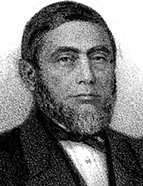

Between the 1830s and 1850s, the period in which Lisboa produced most of his writings, Brazil went from the phase of strong social and semantic instability of the regency period (1831-1840) to the process of political centralisation and stabilisation led by the conservative Saquarema project. It was during this period that Lisboa formed his literary persona, under the false pseudonym Timon - a reference both to Timon, the Misanthrope, from classical antiquity, and also , probably, to the French version embodied by the Viscount of Cormenin in his satires.
In the three decades during which his work was produced, it is also possible to identify the establishment of certain discursive boundaries that would define the protocols through which the Brazilian nation could be thought of historically, and which would find their great organising institution in the Brazilian Historical and Geographical Institute (IHGB), created in 1838. From his journalistic and partisan activities in the 1830s to his work in the Portuguese archives, through the criticism and political reflections of the first phase of the Jornal de Timon, João Francisco Lisboa’s work was strongly marked by the political and intellectual vicissitudes that affected Brazil at that time. This makes it difficult to treat his writings as a homogeneous whole, seeking to extract from them some form of closed and coherent doctrine. His work must be understood, rather, in terms of the different genres in which he wrote and in relation to the different contexts in which he was inserted, revealing the deeply pragmatic dimension of his writing.
The main focus of reflection in his writings published in the Jornal de Timon revolves around the different political party experiences in Western history, from ancient to modern times, turning history into a kind of laboratory for politics. In these reflections, while attacking regional elites with his satirical tone, Lisboa developed a historiographical style that combined the study of the past with political reflection, analysing how different societies balanced the perennial vectors of “authority” and “freedom” – a theme that was central to national political thought at the time. In his later writings, when he replaced Gonçalves Dias in the mission to collect archives at the Overseas Council, João Francisco Lisboa adopted a distinct style, marked both by a greater scholarly investment in the use of historical documentation and by the sobriety and elegance of his narrative.
This work is financed by national funds through FCT - Foundation for Science and Technology, I.P, in the scope of the projects UIDB/04311/2020 and UIDP/04311/2020.
